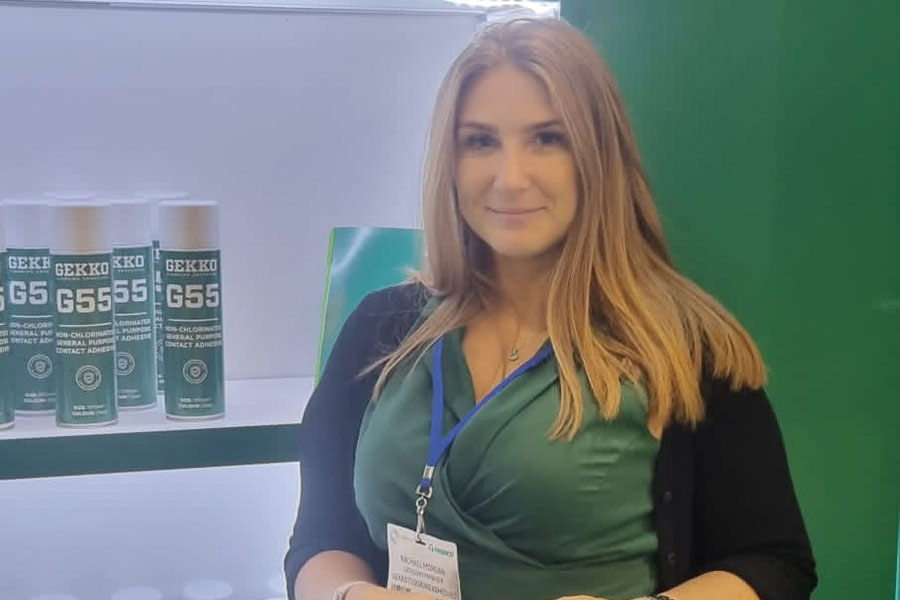Whether you are a national contractor or a local carpet shop, the safety of your
installers should always be a top consideration, says Rachael Morgan.
SO what exactly are you doing to improve your installers’ working environment? I’m not talking cups of tea and early finishes on a Friday, although I’m sure this would be greatly appreciated. But how seriously are you taking their health, safety and wellbeing at work?
Whether you’re a national contractor or a local carpet shop, the safety of your installers should always be a top consideration.
As an employer, you’re required to protect your employees, and others from harm. From identifying a hazard to managing a potential risk, you have a responsibility to ensure the practices you follow and the products and equipment you supply your team are the safest they can be.
So why are so many installers still being exposed to harmful dichloromethane in their daily work? Switching to a DCM-free flooring adhesive is undoubtedly safer, but I understand change is often coupled with concerns about the wider impact to your business. What are the commercial implications? What if the fitters don’t like the smell? What if the results aren’t as good?
If you’re asking yourself these questions, I guarantee you won’t be alone. So why not hear from an experienced flooring contractor who represents a team that has already made the leap to DCM-free? Perhaps this can offer some reassurance.
Established in 2008, Saint Flooring based in Cheshire is a leading approved flooring and interior installer to the UK new house build industry, with five national offices servicing many of the country’s leading property developers.
The business installs upwards of 1m sq m of flooring each year! In March, Saint Flooring Group made the decision to switch the group’s carpet adhesives exclusively to DCM-free. I caught up with Alan Aitken, regional director for Saint Flooring Group, to find out more about why the business decided to make the switch.
‘As a company we pride ourselves on doing everything we can to keep our people safe while also giving back to the environment. We’ve invested heavily in our recycling program, where we recycle everything from carpet, underlay, vinyl and LVT to cardboard and plastic packaging. The health and wellbeing of all our staff – employed and sub-contractors – has always been at the forefront of our minds. This was a strong driver in our decision to move away,’
Alan added: ‘The feedback from our installers was extremely positive. Across the group, our installers have expressed an appreciation of our willingness to change, and to put their health and wellbeing at the top of our agenda day in, day out. At Saint Flooring we value our installation base, and they’re 100% part of the family. We want to ensure that continues for many years to come.’
So sprayable adhesives, no matter how small or large a part they feature in your overall business, shouldn’t be brushed aside or overlooked.
When striving for a safer working environment for yourself and your team, consider all the options that are out there, as every little change can make a difference to the improvement of your working environment. But it doesn’t stop at your doorstep, far from it, we all have a responsibility to encourage the use of safer sprayable adhesives across the industry, put pressure on your local distribution network to offer choice and don’t simply settle for what’s on the shelf if you’re not happy to use the DCM option or the grade of DCM-free they stock.
We should all have the right to say no to dichloromethane and choose the products we use just like the bucket adhesives. Demand manufacturers invest in R&D to improve existing DCM-free options, give feedback on how the product needs to perform to be suitable for use, ‘it’s crap’ or similar isn’t constructive feedback a manufacturer can work with.
Try giving specific details such as: ‘It didn’t dry quick enough in cold weather’ or ‘The smell was stronger than we’re used to.’
Bearing this in mind here are three things you need to know when using a DCM-free product:
- Patience is key! DCM-free spray adhesives are less volatile so flash a little slower; therefore, good ventilation is advised. The flash time doesn’t mean the adhesive performance is affected. DCM-free sprays may be more susceptible to low temperatures, so shake well before use and whenever possible store above 12deg C.
- DCM-free sprays may look wetter. This is normal and once the solvent has flashed it will look and feel like any other spray adhesive. Once the solvent has flashed and the tack has built, the adhesive performance will be unaffected.
- DCM-free sprays smell stronger. This can be for several reasons: DCM adhesives settle at ground level and to add to this DCM is virtually odourless whereas with DCM-free alternatives the solvents rise and pass the nose and naturally are more odorous.
Finally familiarise yourself with DCM and its side effects. The most common side effects are relatively well known such as dizziness, coughing and wheezing, but there are also side effects of using a DCM- based adhesive that are often overlooked or not credited to spray use, such as skin rashes, headaches and blurred vision.
Other symptoms can develop over time and prolonged use can cause kidney problems and even cancer, so consider taking care of your future self and remember it’s never too late to make the switch or invest in suitable PPE.
WARNING: Please don’t hesitate to seek medical attention immediately if you’re concerned by any side effects or symptoms; there’s no shame in prioritising your health and wellbeing.
www.quinglobal.com
Rachael Morgan is category manager, Gekko Adhesives


